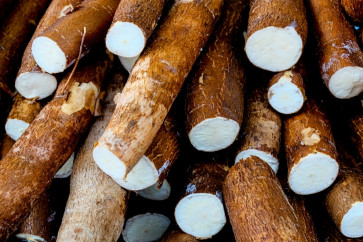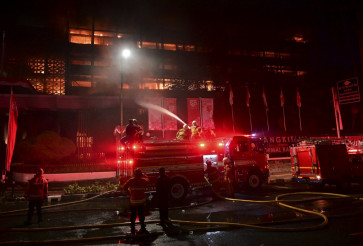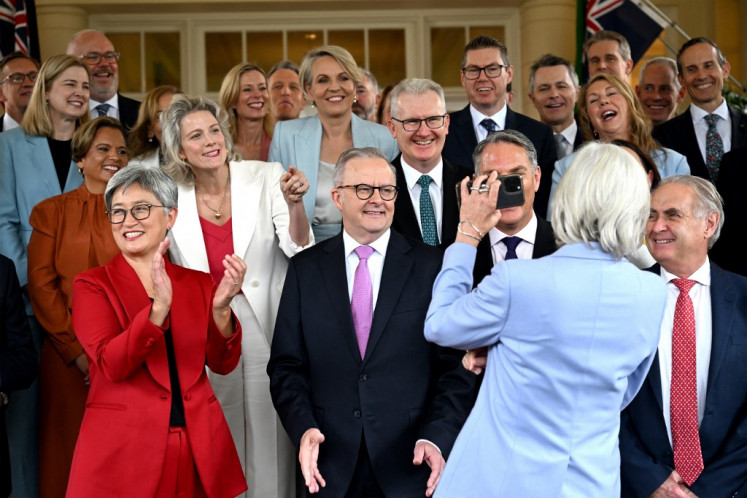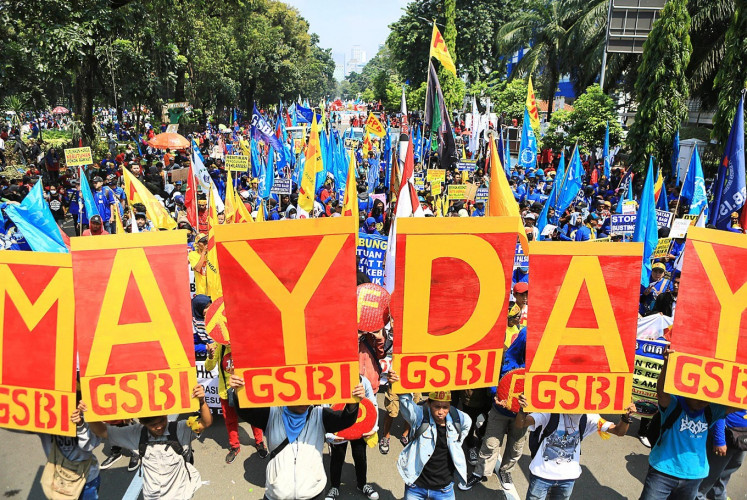Jokowi’s approval rating drops to six-year low
The Jokowi government has come under increasing pressure over the past few months to keep domestic cooking oil prices -- a household staple in Indonesia -- in check.
Change text size
Gift Premium Articles
to Anyone

S
urging commodity prices have taken a further toll on President Joko “Jokowi” Widodo’s popularity, according to the latest poll.
A public opinion survey conducted by pollsters Indikator Politik Indonesia, which surveyed 1,228 people across the country in early May, found that Jokowi’s approval rating stood at 58.1 percent, the lowest point since December 2015, when his rating plunged to 53 percent. In January, his rating was still at 75.3 percent.
Indikator Politik executive director Burhanuddin Muhtadi said on Sunday that inflation, which hit a record 32-month high in April, was the most-cited reason for public disapproval of his performance.
According to data from Bank Indonesia (BI), April’s inflation rate was at 3.47 percent, the highest since August 2019, when the country’s inflation rate was at 3.49 percent.
“With the increasing inflation rate, which now creeps towards 4 percent, the President’s approval has also been under pressure,” Burhanuddin said during an online discussion. “May’s 58.1 percent approval rating has been the lowest in the past six years,” he said.
The Jokowi government has come under increasing pressure over the past few months to keep domestic cooking oil prices -- a household staple in Indonesia -- in check. In a move that shocked the global market, Jokowi decided to ban the export of crude palm oil (CPO) to control the domestic cooking oil prices. The controversial policy, however, has yet to reduce the increasing prices of goods.
While almost 90 percent of the poll’s respondents supported the export ban, more than 72 percent said cooking oil prices remained less affordable, or not affordable at all.
As of last Thursday, Trade Ministry data showed bulk cooking oil was being sold at 16,600 rupiah (US$1.13) per liter, which remained above the Rp 14,000 per liter price cap the government previously required for the palm oil export ban to be lifted.
The CPO export ban came only two days after the Attorney General’s Office (AGO) detained a senior Trade Ministry official and three corporate executives from private cooking oil producers Permata Hijau Group, PT Wilmar Nabati Indonesia and PT Musim Mas -- all members of the Indonesian Palm Oil Association (Gapki).
The four are suspected of having engaged in corrupt practices related to the processing of export permits. The AGO’s investigation into the case is still ongoing.
Aside from a CPO export ban, the government also launched an unconditional cash transfer (BLT) scheme in early April for cooking oil to help lower-income Indonesian homes purchase the staple product. The scheme promised to provide 20.5 million homes with Rp 100,000 per month for three months starting from April.
However, questions linger over the scheme’s distribution, with more than 62 percent of Indikator’s respondents saying that they have not received the cash-transfer initiative.
Herzaky Mahendra Putra, chair of the Democratic Party's strategic communications body, said on Sunday that, while Jokowi’s recent decline in popularity has been “alarming”, it has also been in line with his party’s predictions.
“[Jokowi’s] popularity has been on the decline because the government was not quick to address these real problems… This is a drastic decline, this is the peak of public dissatisfaction,” Herzaky said, as quoted by local media reports.
Herzaky went on to say that former Democratic Party head Susilo Bambang Yudhoyono’s popularity had never slumped to Jokowi’s record low of 58.1 percent during his time as president.
Increasing commodity prices have made Indonesians become more pessimistic about the economy. A survey released in late April by Litbang Kompas, the research arm of Kompas daily, for instance, found 66.3 percent of respondents did not think the government would be able to control the increase in prices of basic commodities.
Meanwhile, another poll conducted in mid-April by Charta Politika found public optimism about the economic situation over the next year plunged from 72.9 percent in November of last year to 59.6 percent this month, the lowest in the past year. (ahw)









